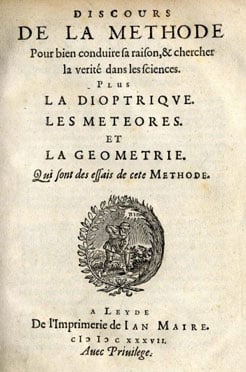Descartes: Cogito ergo sum; I think therefore I am ... what does it mean?

Cogito or Cogito ergo sum, is the Latin translation for Descartes famous claim ‘I think therefore I am.’ This is a pivotal part of the argument for existence that he gives in the Meditations. It is the first thing he says we can know for definite after doubting the existence of everything else. He says we must doubt everything because there is a chance that we are all being deceived by an evil demon so everything we believe to be true could just be an illusion. But it doesn’t make sense to say that we could be deceived about the way we think. The fact that we can have thoughts about the state of the world (regardless of what we doubt) means that there is some ‘I’ that exists. Perhaps there is an evil demon making us believe in a false reality, but there must be something in existence that the demon is manipulating. This is the thinking thing that Descartes calls ‘I.’ The claim ‘I think,’ or ‘I am thinking’ does not require us to have any knowledge or evidence of the world. It is not based on anything else; therefore it does not rely on the truth of a claim that could turn out to be false. From here, Descartes goes on to affirm the existence of God, as he knows his beliefs and thoughts are real (even if they are not true).

The Cogito can only assure Descartes of his own existence, not the existence of anyone else, and we can only use it to know of our own individual existence. This is because we can doubt the minds of other people and the existence of their thoughts. Similarly it can only verify our existence at the point in time when we declare ‘I think’ because anything in the past ‘I was thinking’ or the present, could be something the evil demon has deceived us on. There has been much debate over what Descartes means when he uses the word ‘think.’ Many people question whether this means understanding, reason, intellect etc and think that if it includes these then there is a problem with Descartes reasoning. Personally I think that when Descartes says ‘I think therefore I am’ he is referring to anything that we do that does not involve the existence of something else. For example, we can use reason and intellect a priori; without having to learn anything first or relying on some other concept. I think he also means anything that we can believe without implying a contradiction. It cannot for example, apply to memories, as they rely on an event in the past which we could be being deceived about.
Many people argue that ‘I think therefore I am’ is analogous to saying ‘I am walking therefore I am’ but I disagree with this. My interpretation of it is that Descartes is saying I think therefore I am a thinking thing. From saying that ‘I am walking …’ I can only claim the existence of a walking thing, not a thinking thing and even that can be called into doubt. You cannot claim to exist on the basis of walking because you could be being deceived into believing you had legs or you could be dreaming that you were walking. The only things you can be sure about are events that do not require any interactions to have taken place.
People also claim that Descartes is making a jump between thinking taking place and the existence of ‘I.’ They say that just because there is the existence of thought that does not mean he can conclude that it is he doing the thinking. I am inclined to disagree with this argument. Surely, as I have just said “he can conclude …” it has implied that there is some ‘I’ in Descartes that has allowed him to make this conclusion. The critics affirm Descartes existence whilst at the same time try to argue that he cannot be sure that he exists. A response to this would perhaps be that in the premise of the argument; ‘I think,’ Descartes refers to ‘I’ which he then proves in the conclusion. This is what is known as a circular argument as he uses what he is trying to prove in the premise. It is a fallacy that often occurs in arguments to proving the existence of God. Many would say that this makes the whole argument invalid.
So, to sum up: the Cogito (I think therefore I am) is the first piece of knowledge that Descartes can be certain of. It is highly important in the formulation of the rest of the Meditations. There are interpretation issues over pretty much every part of the Cogito; the use of ‘I’ in the premise and the scope of ‘I think’ being the main ones. I like the Cogito and to me it seems to make a lot of sense and appears fairly self-evident. When I think about things, or I put my thoughts into this hub I am convinced that it is my own capacity and ability to think that is allowing me to do so. However, I do wonder about the usefulness of the Cogito. All it can tell any one person is that they exist at one specific moment in time. It cannot relate to a third person and it cannot relate to the past or the future.







